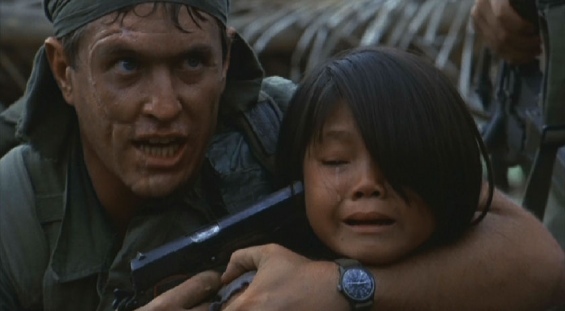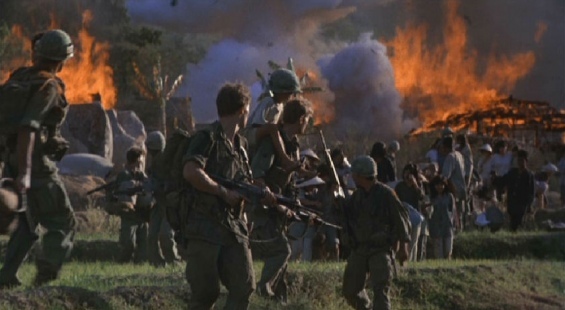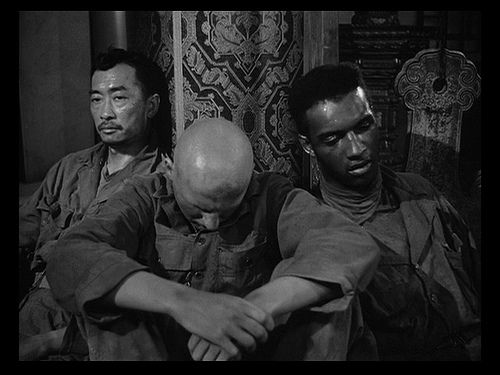Part of my 1987 application for the job of film reviewer at the Chicago Reader consisted of writing three long sample reviews for them in March and/or April — only one of which was published by them (Radio Days), although, as I recall, they paid me for all three. (Writing my pieces in Santa Barbara, I was limited in my choices of what I could write about.) I only recently came across the two unpublished reviews, of Platoon and Round Midnight, in manuscript, although I recall that I did appropriate certain portions of them in subsequent reviews. Otherwise, the first publications of these pieces are on this site. — J.R.
**PLATOON
Directed and written by Oliver Stone
With Charlie Sheen, Tom Berenger, Willem DaFoe and Keith David.
“I mean, you know that, it just can’t be done! We both shrugged and laughed, and Page looked very thoughtful for a moment. “The very idea!” he said. “Ohhh, what a laugh! Take the bloody glamour out of bloody war!”
Michael Herr, Dispatches
The myth of lost innocence that permeates American movies like some omnipresent air freshener ultimately has a lot to answer for. Insofar as callow youth is generally thought to be the best possible excuse for ignorance, the means by which the naivety of an individual (or a country) gets affectionately excused becomes part and parcel of an inexorable process which seems designed to protect and preserve that ignorance more than overcome it.
Oliver Stone, the scriptwriter who worked on Midnight Express, Conan the Barbarian, Scarface, 8 Million Ways to Die and The Year of the Dragon and who wrote and directed last year’s Salvador, has been giving the theme of lost innocence something of a new lease on life. His heroes are usually sadder and wiser at the end of their adventures without having learned anything very concrete, because their education is essentially metaphysical, not practical; at best, they’ve learned that the world is a more evil place than they originally thought, but how and why this is so seems not to matter very much.
The reasons for this are more commercial than philosophical: the trick is to keep us innocent as spectators and, at the same time, make us feel that we’ve somehow gone through a “learning” experience. In Midnight Express, this meant being appalled at what an American caught with pot has to go through in a Turkish prison, and indifferent to what a Turk has to go through in the same place. In Salvador, this meant perceiving the political complexities of El Salvador from the vantage point of slob/gonzo journalism and James Woods’ vast collection of Hawaiian shirts — a sort of enlightened world view that could adequately be summarized as The Blues Brothers Go To Central America.
The motto of Stone’s narcissistic credo of mercenary journalism is spoken by the hero’s photographer friend in Salvador, a reckless adventurer lusting after the glory of a Robert Capa, just before dying: “You gotta get close to tell the truth. You get too close, you die.” The problem with Stone, who makes a great show of truth-telling, is that he gets too close to tell the truth — too close, that is, to his audience and his camera subjects, not to his ostensible themes. Regrettably and paradoxically, in the case of Platoon — the best film he has worked on to date, and in some ways the least deceitful Hollywood movie about Vietnam made so far by anyone — this principle is fully and decisively in force.
Perhaps it would be utopian to expect anything different. There is conceivably no better index to the ongoing confusion of this country about Vietnam than the Hollywood films which have and haven’t been made about the subject. When the U.S. presence in Vietnam was still a daily fact in the 60s, the profound divisions that this created in American life were too wide to be commercially exploitable: any treatment of the issue was bound to alienate too large a section of the potential audience to foster a credible illusion of consensus. Even John Wayne’s rather plaintive effort to apply the “lessons” of World War II and Korean War heroics to The Green Berets (1968) — the only large-scale, simple-minded war film about Vietnam financed by a major Hollywood company — saw fit to include a skeptical journalist with dovelike leanings among its otherwise hawkish characters, as an unbeliever who had to be converted by Wayne’s Colonel Kirby.
This conversion was basically a matter of acknowledging the unlimited savagery of the North Vietnamese — the same sort of racial typecasting common assigned to Japanese and North Koreans during the two previous decades, and the great escape clause for most subsequent treatments of the war as well. In order to try to locate the war’s madness within a containable image of externalized evil rather than see it as a consequence and function of certain ideological processes, both Michael Cimino’s The Deer Hunter (1978) and Francis Coppola’s Apocalypse Now (1979) had to reach beyond the facts. As Deirdre English put it several years ago, each film took “a fabricated act of Vietnamese terror” — the ultra-sadistic Russian roulette game of The Deer Hunter, the hacking off of inoculated children’s arms in Apocalypse Now — “and elevated it to become the central metaphor of the war.” In both cases, this displaced the internal turmoil of America’s feelings about the war onto some vaguely defined Other, leaving it to future generations to figure out just how much of this internal conflict wasn’t being dealt with. Significantly, while The Green Berets flopped with the public and critics alike, the equally racist The Deer Hunter wound up with as many raves, Oscars and spectators as are currently being predicted for Platoon, while the more equivocal and subtle Apocalypse Now had its own defenders as well.
Stone’s film is happily free of Wayne’s and Cimino’s racism and Coppola’s Third World mythologizing, but the Vietnamese in it are still essentially regarded as props to illustrate our Fall from Innocence — incidental pawns in a solipsistic American tragedy that inconveniently happens to be occurring in someone else’s country. In the 50s, a liberal director showing us Asians (such as Samuel Fuller) would usually imply that they’re “just like us,” while in the 60s and 70s Wayne and Cimino suggested that the North Vietnamese weren’t even human. Stone treats them as human and inscrutable, which probably represents an advance over both previous positions, but is still a long way from sophistication.
To expect a movie like Platoon to clear up all our confusion about Vietnam would be asking too much; but to expect it only to make us feel more comfortable with our confusion would surely be asking too little. The problem with either expectation is that, despite much hype to the contrary, the requirements of entertainment and those of clarification may not be identical or even necessarily compatible. Indeed, the impulse that makes us want to set our thoughts in order about Vietnam may actually be in direct conflict.
Stone starts from his own combat experience in Vietnam — as a rookie volunteer arriving somewhere near the Cambodian border in the fall of 1967 — and the most remarkable achievement of Platoon is its very tactile grasp of what that time, place, and experience must have been like. One combat veteran has informed me that the sounds of artillery and explosions are almost never accurate in relation to what one sees, but apart from this lapse it seems clear that Stone has maintained an overall level of authenticity which no other Hollywood director has approached. Physical discomfort and disorientation, the speech and body language of the grunts, and the sharpened sense of sound and image likely to come to someone on the lookout for a possible ambush, are all caught as precisely and indelibly as in Herr’s Dispatches. Stone is particularly good at conveying more of the wit and music of blank slang than usually finds its way into American war fiction, and Keith David’s charismatic performance as the hero’s more seasoned buddy, King, plays a welcome role in tempering Stone’s autobiographical self-indulgences with some saving irony. (After King listens to Taylor’s rather tortured class-related reasons for dropping out of college to enlist, his response is, “Shit — you gotta be rich in the first place to think like that.”)
But such irony is infrequent. Chris Taylor (Charlie Sheen) is tricked out with so many hackneyed traits and devices that he never gets very far beyond the range of a multifaceted conceit. The combined casting of Martin Sheen’s son and the portentous off-screen narration he delivers already conspire to relate the film back to Apocalypse Now, but that’s only the beginning of the heavy references and postures. Reciting off-screen letters about the war to his grandmother, Taylor becomes the medium for all of the movie’s most jejeune literary ideas, cluing us into matters that Stone has not managed to integrate or dramatize elsewhere. While King’s advice to Taylor is usually along the lines of, “Just keep your pecker hard and your powder dry and the world will turn,” Taylor’s advice to the spectator is to regard one of the platoon sergeants (Tom Berenger’s Barnes) as evil incarnate and the other one (Willem Dafoe’s Elias) as saintly, to view Barnes as “our Captain Ahab” and both sergeants as “my two fathers,” “fighting for possession of my soul”. With this much literary coaching, the spectator has no room left for any independent thinking about these increasingly schematic figures (one hesitates to call them characters, or even people). Platoon comes to us equipped with its own set of Monarch Notes, and nothing has to be sweated through or worried over — it’s all predigested for immediate consumption.
Yet at the heart of this contrivance is an insight about America’s ambivalent relation to the war that adds something significant and important to the previous movie versions. Stone sees the U.S. Army in Vietnam fundamentally split between two factions, the dopers and the lifers, and more at war with itself than with any external enemy — hence a precise duplication of the political divisions found back at home. As suggested earlier, this internal conflict was too much of an embarrassment for Platoon‘s predecessors to acknowledge, and this no doubt helps to explain why it took Stone something like a decade to get this film financed, and then only by an English production company, Hemdale (which also paid for Salvador). Yet as welcome as this insight is, it eventually becomes a means of distortion and evasion through Stone’s excessive reliance on it.
Before it ultimately capsizes under the literary pretensions that Platoon virtually starts out with, Apocalypse Now clearly has some awareness of American guilt regarding the war. In one memorable instance of violence set on a river boat, where several Vietnamese are needlessly killed by nervous Americans because of a misunderstanding regarding a hidden puppy, it also suggests the extent to which sentimentality about this violence can mystify our sense of what happened in Vietnam as much as indifference. Building on some of the same kind of complexity, the best sequence in Platoon, which depicts the gradual escalation of American violence directed against a farming village, sustains a disturbing moral ambiguity in relation to audience attitudes and identification. It occurs shortly after the members of the platoon have found a black buddy crucified in the jungle, so the audience is itself keyed up for some violent act of retribution.
At one point, frustrated in not understanding the ambiguous grin of a farmer, Taylor angrily fires at his feet to make him dance; before long, another young soldier has split the same farmer’s head open with his rifle butt, and the violence continues to spiral wildly out of control. Witnessing the rapid contagion of fear and incomprehension on both sides while sharing the soldiers’ uncertainties about what the villagers are saying and thinking (apart from a few partial translations), we are invited to experience the same trigger-happy hysteria and yet see the immediate, horrific consequences of this. For a few moments, at least, the force of the war’s horror and the full ugliness of our role in it are given a shattering expression, fulfilling the movie’s broadest claims for itself.
But having reached such a recognition, the film quickly backs away from it, reducing the whole moral question to a fight that breaks out between Barnes and Elias, who respectively approve and disapprove of the violence. Taylor, meanwhile, while heroically preventing a rape, ceases to be ambiguous on any level, and for the remainder of the film becomes a simple dispenser of justice, like Tom Mix. In one fell swoop, he and the audience are let off the hook for keeps, and the black and white comic-book metaphysics of The Green Berets and The Deer Hunter, complete with the same macho nonsense, simply get transferred over to the American side rather than split between Yanks and gooks. There’s a shift in the rules and players, but the game being played is essentially the same. It does not involve thought or analysis of any kind.
One imagines that the true horror of combat is the necessity of having to make drastic decisions without always being able to know the results. This nightmare is suggested in the village scene, but Stone’s solidarity with that aspect of combat experience is effectively thrown out the window almost as soon as it’s brought up. From then on, he makes sure that we always know more than the characters do, restricting all notions of confusion and chaos to their metaphysical (as opposed to practical) manifestations. Eager (and able) to keep our attention glued to the screen, Stone aims to give us a rattling good war film, full of suspense and Dolby effects, and even makes us feel virtuous in the process. The real issue isn’t whether or not he succeeds — although it’s somewhat regrettable in this case that he does — but whether we prefer a fleeting half-truth to something that settles and sticks in our craw.












